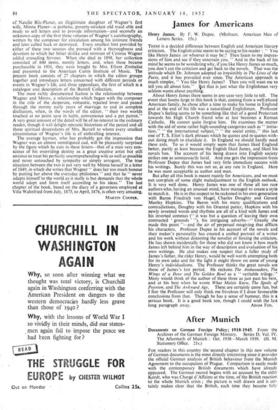After Munich
FOR readers in this country the-second chapter in this new volume of German documents is the most directly interesting since it provides the official German analysis of British behaviour from the Munich Agreement to the occupation of Prague. Comparison is easily made with the contemporary British documents which have' already appeared. The German record begins with an account by the elder Nordt, who was Chargé d'Affaires at the time, of the British reaction to the whole Munich crisis ; the picture is well drawn and it cer- tainly makes clear that the British, each time they became. fully
aware of the menace of violent aggression from Hitler, determined to resist it to the last.
Dirksen, the Ambassador, returned to London a few dayi later, and thereafter it is mainly with his reports that the reader is con- cerned. We now know that Hitler was ,merely annoyed to have been held up for the winter by the conference at Munich and paid no serious attention to the pleas of Chamberlain or the recommendations of Dirksen. The latter several times begged that " dangerous political poison-mongers " like Mr. Churchill and Mr. Eden should not be aided by publicity such as the broadside let off against them by the Fairer in his Saarbrucken speech. All the satisfaction the Ambassador received was the instruction from Berlin that " no chance for an attack on Duff Cooper, Churchill or Eden should be missed." After the anti-Jewish riots in Germany on November 10th he reported a set-back for Chamberlain " in view of the British public's well-known lack of understanding for and antipathy to the treatment of the Jewish question by National Socialist Germany." On a later occasion Dirksen wrote : " Never in all my life did I feel such shame."
Perhaps the most startling document in Chapter II is an account by Dr. Hesse (representative of the Deutsches Nachrichten Buro and Dienststelle Ribbentrop in London) of an interview of his with Mr. Steward, the Prime Minister's " Press chief " (as Dirksen called him), very shortly after Munich. Mr. Steward is said by Dr. Hesse to have confided to him that Chamberlain had " ignored the provisions of the British Constitution and customary Cabinet usage " by riding rough-shod—like any dictator—over his colleagues and the Foreign Office. One can only suppose that the man who talked with such openness to a well-known Nazi agent believed, as Chamberlain must have, that the policy of appeasement justified any means to bring about its realisation. " My informant," Hesse continued, " ex- pressly drew my attention to the fact that an extremely bitter feeling against us prevailed in the whole of the Foreign Office. He thought he could assure me that there they had sworn to be revenged ' on Germany and particularly on von Ribbentrop."
While Dirksen reported on October 31st—probably correctly— that " Chamberlain has complete confidence in the Fiihrer," the British documents have shown us that the Foreign Office was at least pretty well informed as to what was going on in Central Europe. On about the same day as Dr. Hesse saw Mr. Steward, Sir Roger Makins (then Mr. Makins), who was serving on the International Commission set up to execute the Munich Agreement, wrote from Berlin to Sir William Strang (then Mr. Strang), " Once the principle of negotiation under threat of violence has been accepted, it is difficult to find a position at which a stand is possible. The atmosphere \fiere is not yet one of compromise or negotiation."
Chapter I of the German documents now published displays the ruthless cynicism of the Germans towards the Czechs throughout the period ; the Nazi Party, Weizsacker and his Wilhelmstrasse colleagues, and the Wehrmacht leaders were almost equally re- morseless, the last of the three often beating the other two at the game in spite of all one has heard about their correct behaviour. A climax was reached in March, 1939, the month during which Hitler had determined to complete the liquidation of the Czechs. This was to be justified before the world by a demonstration of the incurably anti-German fanaticism of the Czechs. But those maddening people were a disappointment to Hitler to the last. On March 12th the German Legation in Prague wired to Berlin, "Representative of
'the German Volksgruppe deplores the perfectly correct, even accom- modating, attitude of the Czechs, everywhere," while on the fol- lowing day the German Consul in Brno, after complaining of Czech insults and provocation to the local Germans, added, "I hear in strict confidence that the German demonstrations, the organised nature of which has also struck the Czechs, are to continue until



































 Previous page
Previous page